Beef and Broccoli – Restaurant Quality! (VIDEO)
This post may contain affiliate links. Please read our disclosure policy.
This is the best Beef and Broccoli you’ll ever have – the beef is juicy and tender, the broccoli is cooked perfectly (not soggy!), and everything is cooked in the most delicious, flavorful sauce!
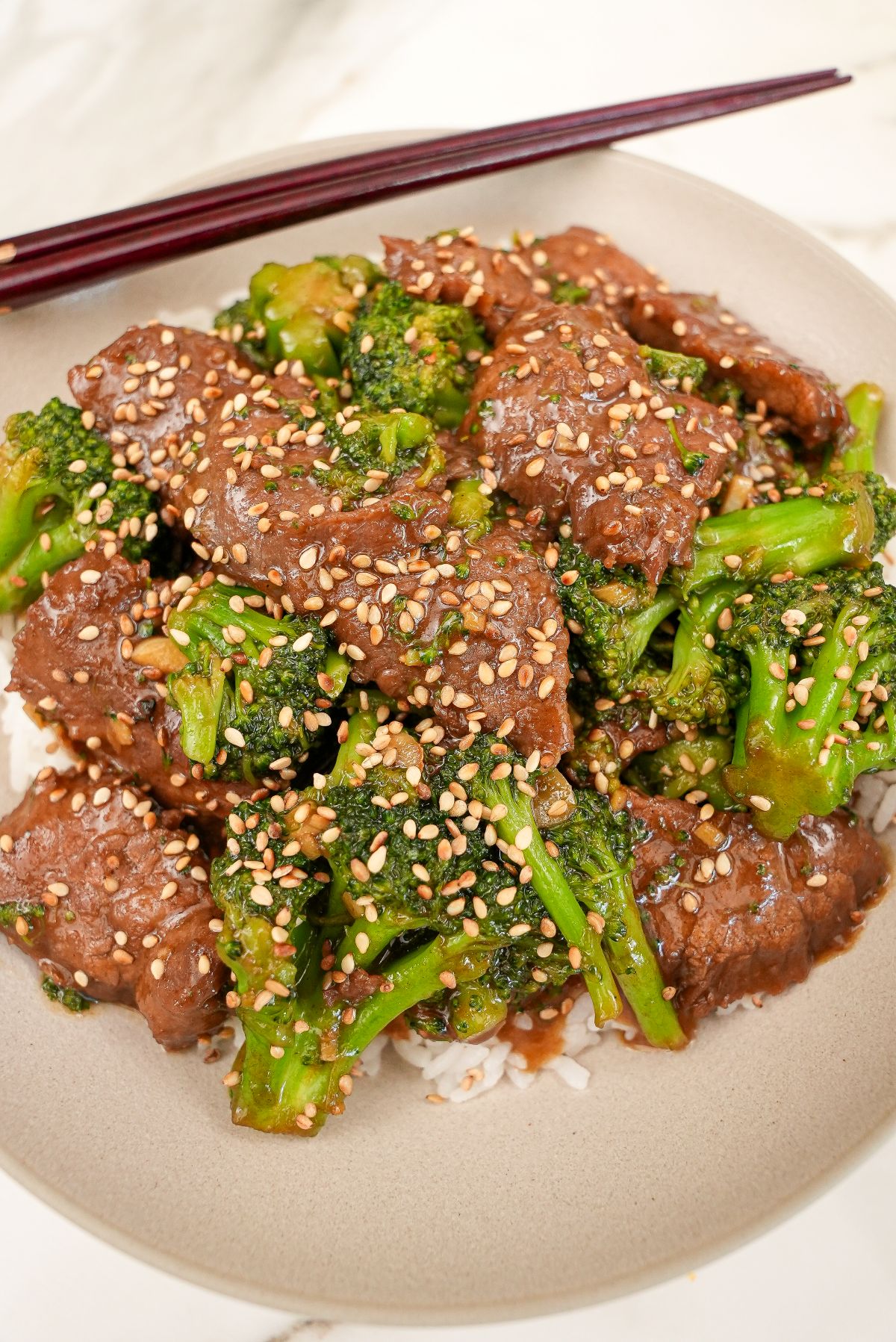
Watch the Beef and Broccoli Recipe Video!
A Note from CJ

My Beef and Broccoli is better than restaurant quality!
There is a reason this recipe has gone viral multiple times – it’s truly the best! The beef is tender from the marinade, the broccoli is cooked perfectly, and the sauce is SO good – this is truly one of my favorites!
Serve it alongside favorites like Chow Mein, Orange Chicken, Sesame Chicken, Mongolian Beef, Egg Rolls, Egg Fried Rice, Sesame Chicken or Black Pepper Chicken!
I followed this recipe exactly and it came out tasting like a restaurant quality dish. I never thought I could make a beef broccoli this amazing, but CJs recipe/instruction ensures a beautiful dish.
Ingredient Tips
See the recipe card for full information on ingredients and quantities.
- flank steak, cut into 1/4″ strips; Make sure you are slicing the flank steak against the grain – this is an easy way to ensure your meat will be tender.
- baking soda – baking soda neutralizes acid and raises the pH level, which makes the beef more tender when cooked
- dark soy sauce – dark soy sauce is thicker, darker, and sweeter – primarily used to add color and a richer, more intense flavor.
- msg – I like to use this in moderation as an optional flavor enhancer
- chicken stock – if you don’t have chicken stock, you can substitute with water
- shaoxing wine – if you can’t use Shaoxing wine, you can substitute with sherry, mirin, or chicken stock/broth.
- broccoli – avoid the pre-cut broccoli and get crowns from the store that you can cut into similar sized pieces so they cook evenly.
How to Make Beef and Broccoli
Prepare the Beef and Prepare the Broccoli – Slice the beef against the grain into 1/4-inch strips, then marinate it with baking soda, oyster sauce, soy sauce, salt, white pepper, oil, and cornstarch for 15 minutes. In a separate bowl, whisk together the sauce ingredients—light and dark soy sauce, oyster sauce, sugar, white pepper, sesame oil, MSG, shaoxing wine, chicken stock, and cornstarch—until smooth. Blanch the broccoli in boiling water for 30–60 seconds until bright green and slightly tender, then drain and set aside.
Cook the Beef, Stir Fry Sauce, and Broccoli – Heat neutral oil in a wok over high heat until just smoking, then sear the beef for 2–3 minutes until browned and remove it, leaving the oil behind. Stir-fry garlic and ginger for 15 seconds, add the broccoli, and cook briefly before returning the beef to the pan. Pour in the premixed sauce and cook for 1–2 minutes until it thickens and coats everything evenly. Finish with sesame seeds and serve hot with steamed rice.
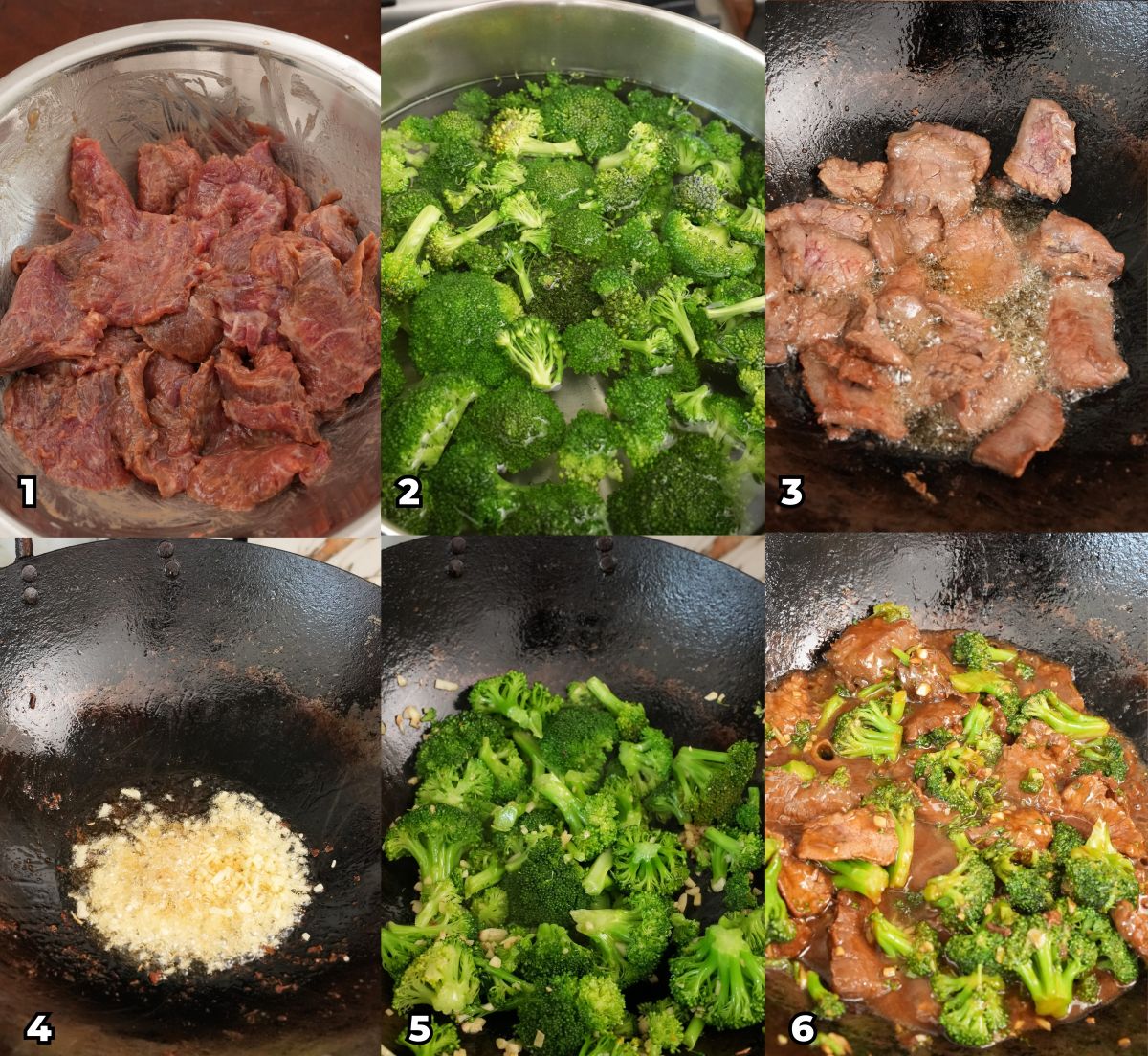
Key Tip
CJ’s Recipe & Storage Tips
Don’t overblanch brocoli – other recipes may call for blanching the broccoli for 2-3 minutes; doing so will result in the broccoli turning soggy once added to the sauce. Blanch broccoli for only 30 sec – 1 min so the broccoli will soften slightly, but it’ll finish cooking in the wok. It’s best for the broccoli to still have a bite so it contrasts with the soft beef and sauce.
Have everything ready to go! – Once you start cooking, this recipe will come together very quickly. Have your premixed sauce, noodles, and vegetables ready and easily accessible during the cooking process.
Re-stir the cornstarch slurry before adding – the cornstarch will settle at the bottom as it sits, so it’s important to re-stir so you have no lumps and get even thickening.
Storage and Reheating – Store any leftover Beef and Broccoli in an airtight container in the refrigerator for up to 3-4 days. The broccoli will soften as it sits in the refrigerator (sometimes to the point of being mushy) – this is normal. Reheat until warmed through in the microwave.
If you tried this Beef and Broccoli or any other recipe on my website, please leave a 🌟 star rating and let me know how it went in the comments below!
Beef and Broccoli (Video)
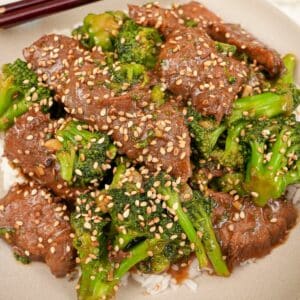
Equipment
Ingredients
Beef
- 1 lb flank steak, cut into 1/4" strips against the grain
- 1/4 tsp baking soda
- 1 tbsp oyster sauce
- 1 tbsp light soy sauce
- 1/2 tsp salt
- 1/4 tsp white pepper
- 1 tbsp neutral oil, I used avocado oil
- 1 tbsp cornstarch
Sauce
- 2 tbsp light soy sauce
- 1/2 tbsp dark soy sauce
- 2 tbsp oyster sauce
- 1 tbsp sugar
- 1/2 tsp white pepper
- 1 tsp sesame oil
- 1/4 tsp msg, optional
- 1 tbsp shaoxing wine
- 1/2 cup chicken stock
- 1/2 tbsp cornstarch
Vegetables, Oil, and Garnish
- 1/4 cup neutral oil
- 1 lb broccoli, cut into 2" pieces
- 5 cloves garlic, chopped
- 1 tbsp ginger, chopped
- 1 tsp sesame seeds, for garnish
Instructions
- Slice your beef into 1/4" strips against the grain, then add it to a bowl with with baking soda, oyster sauce, soy sauce, salt, white pepper, oil, and cornstarch. Mix until combined and marinate for 15 mintues.
- In a small bowl, mix the suace together by combining light soy sauce, dark soy sauce, oyster sauce, sugar, white pepper, sesame oil, msg, shaoxing wine, chicken stock, and cornstarch.
- Bring a large pot of water (5 quarts) to boil over high heat and blanch your broccoli 30 seconds to 1 minute or until bright green and slightly softened but still firm; drain and set aside.
- Add the 1/4 cup neutral oil to a wok or large pan over high heat until just smoking. Sear marinated beef strips for 2-3 minutes until nicely browned. Remove the beef to a tray and set aside, leaving the oil in the pan.
- In the same pan over medium high heat, fry ginger and and garlic for 15 seconds. Add the broccoli and stir fry for 30 seconds.
- Add back the beef followed by the premixed sauce and continue cooking for 1-2 minutes until the sauce has thickened slightly and coated the beef and broccoli.
- Garnish with sesame seeds. Serve with freshly steamed white rice and enjoy!
Video
Notes
- flank steak, cut into 1/4″ strips; Make sure you are slicing the flank steak against the grain – this is an easy way to ensure your meat will be tender.
- baking soda – baking soda neutralizes acid and raises the pH level, which makes the beef more tender when cooked
- oyster sauce – my favorite is by the brand Lee Kum Kee (with the lady on the label, not the panda)
- dark soy sauce – dark soy sauce is thicker, darker, and sweeter – primarily used to add color and a richer, more intense flavor.
- msg – I like to use this in moderation as an optional flavor enhancer
- chicken stock – if you don’t have chicken stock, you can substitute with water
- shaoxing wine – if you can’t use Shaoxing wine, you can substitute with sherry, mirin, or chicken stock/broth.
- broccoli – avoid the pre-cut broccoli and get crowns from the store that you can cut into similar sized pieces so they cook evenly.
Nutrition
Nutrition information is automatically calculated, so should only be used as an approximation.
This Beef and Broccoli recipe was originally published in September 2023, and updated in November 2025.

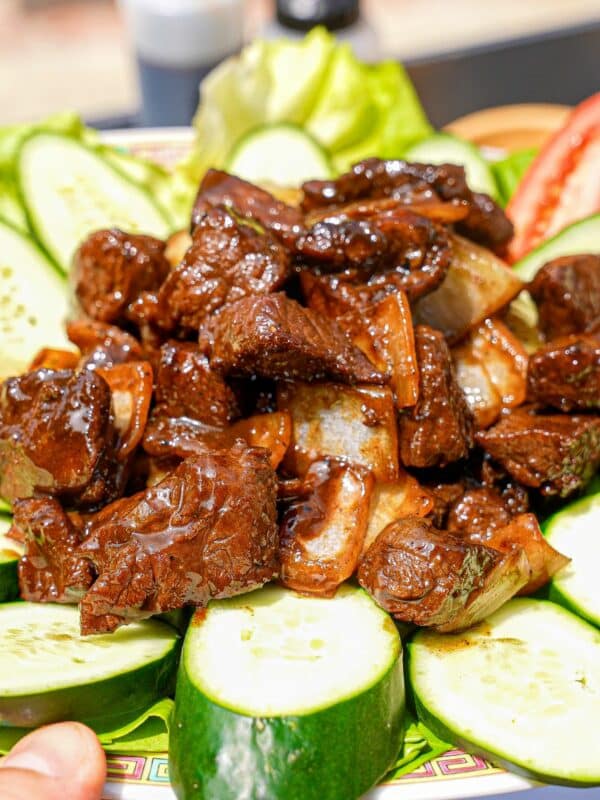
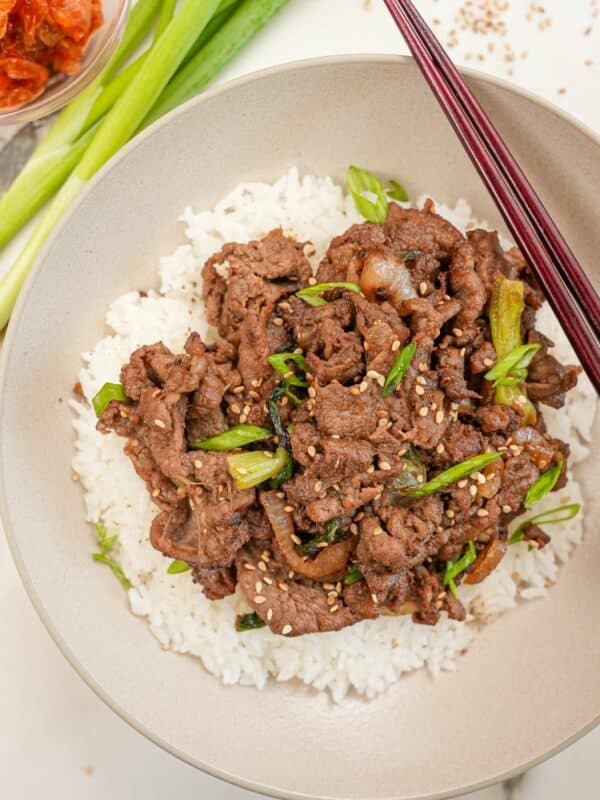

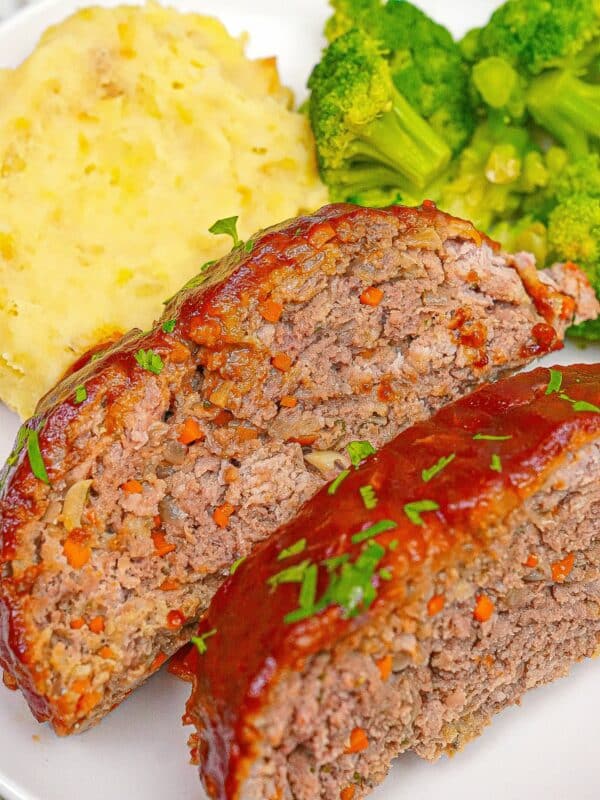







Another favorite. Hits the spot. Thank you for sharing.
Love this recipe. Really easy and tastes great every time!
My husband and I love this recipe. It is absolutely the best beef and broccoli recipe. I have added it to the dinner rotation since we started making it so frequently!
IG: @heather.wightman
huyenduong119@yahoo.com
One of our favorite recipes of CJ’s and another one we’ve made often. Definitely a must do.
Amazing and so easy
This is so good!
YES. White pepper is my new favorite condiment. Thank you for such a winner.
Excellent and the best I’ve ever tasted recipe. 5 stars ⭐️ ⭐️⭐️⭐️⭐️
This is one of my fav recipes from you ! Thankyou
This is the easiest and best recipe for Beef and Broccoli that I have ever made.
So delicious! I shared it with a neighbor and she thought it was take out!